July 29, 2022
Summer Reading
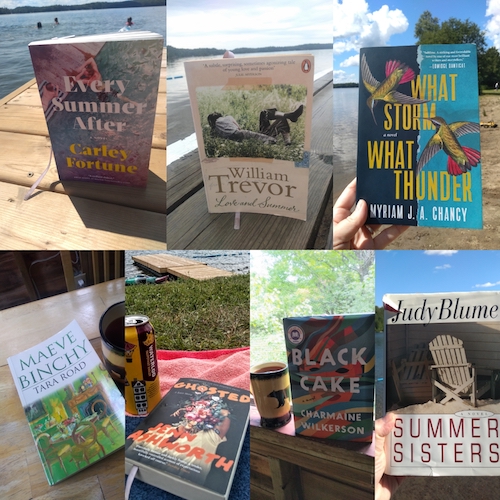
I would say that time’s gotten away with me since my week in Muskoka earlier this month, but that’s not strictly true. In fact, time has very much been on my side these last two weeks, which means that I’ve not been very busy, had enough time to do the things I need to do, and haven’t pushed myself to accomplish very much extra, such as recapping my holiday reads. But I’m finally going to get it done right now, because the reading was just so excellent.
I started with a reread of Judy Blume’s Summer Sisters, which was published in 1998, and I don’t recall the circumstances under which I read it the first time, except that I think it was a book I enjoyed along with my mom and sister. And when I read it again, I was surprised to find out how much of it was still so familiar to me, even though I probably haven’t read it or even thought about it much in the last twenty years. Such a great summer book, rich and sweeping and just a little bit trashy. Holds up entirely, except for Vix’s reference to that Cherokee ancestor who’d gifted her those cheekbones, because we just don’t do that anymore. Lots of swimming in the pond on Martha’s Vineyard.
And next was Black Cake, by Charmaine Wilkerson, which I found absorbing, even if the storytelling style didn’t really work for me, skimming a (too) broad surface instead of plumbing depths. But it was still really fascinating, first with lots of ideas about food and colonialism and culinary history, and one of the characters is even an ocean scientist—there’s a whole lot going on. My favourite part, though, was the swimming, which I wasn’t expecting, because most Black characters in Caribbean-set books don’t get to swim so much, but swimming is a big part of the storyline here, as well as surfing, and I loved that.
And then I read Ghosted, by Jenn Ashworth, which I bought when we were in the UK because it was shortlisted for the Portico Prize for Northern English writing. I also bought her novel The Friday Gospels, and loved it, so expectations were high—and oh, she delivered. Ghosted is about a woman whose husband disappears, and she doesn’t tell anyone, which is kind of suspicious, plus she leads a pretty isolated life anyway and has a complicated relationship with her ailing father. There are secrets, but just like in Gospels, they’re not what you think they are, and Ashworth has such a gift for crafting suspense and writing sympathetic characters who are heartbreakingly human. No swimming, but scenes set in Morcambe and Brighton mean beaches definitely factor.
Following that, I read Tara Road, by Maeve Binchy, whose books I always dismissed with literary snobbishness, but I’ve come round, though hers is a curious kind of storytelling, very much telling. But what a wondrous tapestry of family and community Binchy weaves here, and I was utterly absorbed in this story which sweeps decades and continents, with women at the centre. Wasn’t expecting much swimming in this one, but there is a scene at the beach which inspired the opening scenes of James Joyce’s Ulysses!
Another Irish novel up next, Love and Summer, by William Trevor, the third novel I’ve read by him, and the least subversive, though it was in its own way, just more subtly so than the others (Miss Gomez and the Brethren and Death in Summer, both of which had evil lurking on its fringes and such wonderful dark humour). I think I love the works of William Trevor, and want to read them all. No swimming here, but there is a lake where Florian Kilderry walks his dog, and this is very much a novel about the pains of restraint and so nobody dives in.
I’ve already written about What Storm, What Thunder, by Myriam J.A. Chancy (SO GOOD!), which is definitely not a swimming novel. The one character who ventures into the sea ends up in a tsunami, so consider that a warning, but oh, what a book.
And finally, Every Summer After, by Carley Fortune, which is a much hyped book of the summer, perhaps too hyped for my liking, but I enjoyed it well enough, and its main character swims across the lake every summer, which is the kind of project I can get behind.
May 5, 2022
Good Things About England
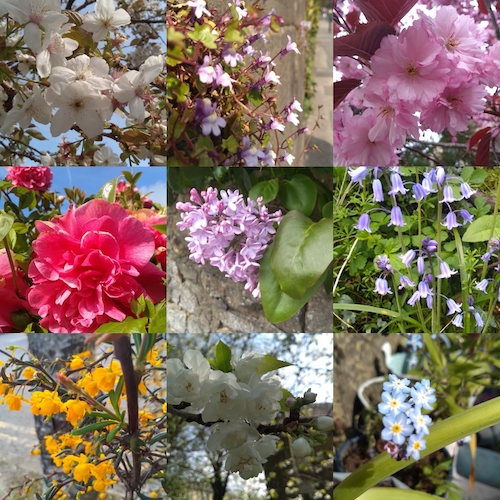
I’ve always lived by the proverb, “Go to England for a week, and you’ll have a nice holiday. Find an English husband, and you’ll be going to England frequently over the course of your lifetime.” But it had been far too long since our last visit, our trip scheduled for March 16, 2020, having been cancelled when the entire world shut down. Sometimes it felt like we might never get to go again….but we did! The long-awaited April 2022 trip happened, and it was incredible, so excellent to be back out in the world again, having adventures, smack dab in the middle of springtime.
Things we loved about our trip to England, in no particular order.
- The weather. It was sunny every day and we came home with tans and new freckles on our noses.
- Our flat. We stayed at the most wonderful Air BNB around the corner from Lancaster Castle, with a ten minute walk to the city centre in one direction and a ten minute walk to Stuart’s sister’s house in the other. It was so comfortable and filled with light.
- Swimming!
- We drove an electric car and it was so much fun, and I ended up spending a grand total of $45.00 on charging for the entire week.
- Our family! We got to visit again for the first time in so long, and also meet our three-year-old niece/cousin, who was more than worth the wait and we adore her.
- Bookshops! Lancaster features a Waterstones AND a wonderful Oxfam bookshop, where I was able to pick up two novels by Barbara Trapido. And one morning we drove to Lytham St. Ann’s for a visit to Storytellers Inc, which I picked up a veritable tower of titles.
- Special dinner on the canal. We didn’t dine indoors while we were in England, but thankfully were able to enjoy picnics, and other outdoor delights, including a dinner at the Water Witch on the Lancaster Canal, which is where it dawned on me that my children were old enough now that travelling with them was just so thoroughly a delight instead of a chore, and I felt very lucky. Plus the lamb shank was so good, and we had stick toffee pudding for dessert.
- The blossoms. Bluebells, pink trees, camellias, even an early lilac, and so much more. It was a floral feast.
- How relaxing it felt to get away…especially from Covid. I read the Saturday Guardian while we were there, and it didn’t mention Covid at all? My jaw didn’t hurt from stress clenching for the first time in two years. Honestly, the fact that we all ended up getting Covid didn’t even damped the moon.
- To remember that good things are possible. Oh, it felt so wonderful.
September 28, 2021
Getaway
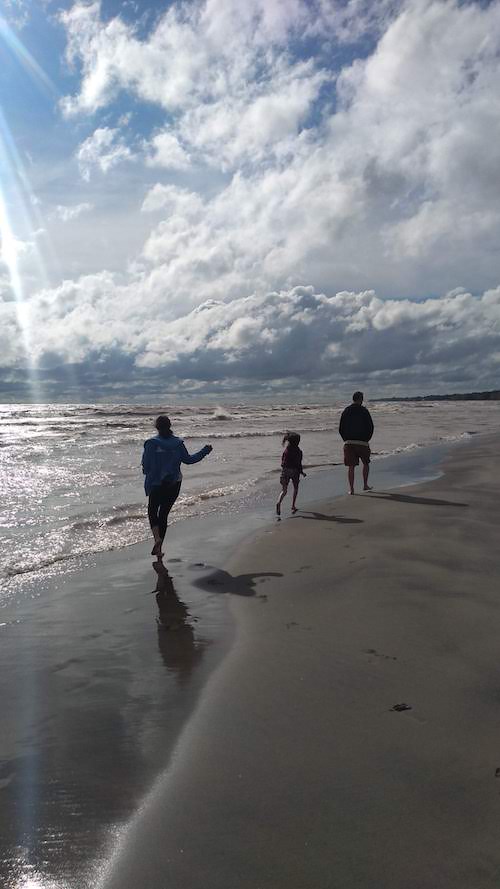
“I can’t believe we’re going camping tomorrow,” Iris kept repeating on Thursday as we moved through the motions of a perfectly ordinary weekday. (A perfectly ordinary weekday. Can you imagine? Getting breakfast on, walking kids to school, greeting friends at the school gate? And can you imagine what a pleasure are these motions, especially after so many months without them?”) And I felt exactly the same as she did, back on the roller coaster of work and school, deadlines and dates on the calendar, even if that roller coaster moves more cautiously than it once did, easier on the twists and turns. Because once we’re stuck in our routine (and I love our routine. For months and months, the familiarity and support of our routine was everything I longed for, but still) it seems impossible to imagine any other way of doing things. But in July, with still no idea what the near future would hold, I’d booked a camping trip, just to keep summer going for a little bit longer, and because I had this suspicion we might find ourselves in need of a getaway.
And so we went, impossibly. On Thursday both children were learning at their desks, and on Friday they were helping us pitch a tent on the shores of Lake Erie where we spent two days offline and in nature, and it was wonderful, and significant for being our first off-season camping venture. Even more significantly: our last outdoor swims of 2021 as well in the churning waters of this great lake (our third Grade Lake in as many months!).
A reminder that sometimes what makes the impossible possible is one simple thing: you just do it.
August 23, 2021
Holiday Reading Part 2
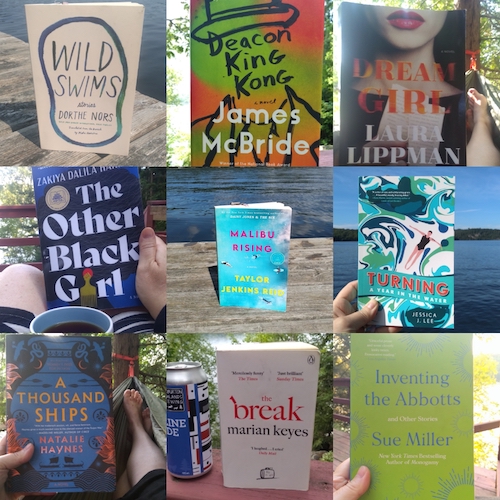
There were no duds in this stack, and even the title I was most intimidated by (hello, novel about the Trojan War!) blew me away. Every single one of these very different books was an absolute stunner, and the connections between them (as always!) were fascinating—see chart below. I was also so happy to reread Turning, which I’d read on vacation three or so years ago, and which I enjoyed but found so SPECIFIC that I wasn’t quite sure it would resonate again, so I gave it away, which I regretted for years. A new copy found its way back into my life this year, however, so I was happy to read it again. By a lake, of course.
I LOVED Malibu Rising—while I liked her previous novel, it didn’t quite live up to the hype for me. This one, however, was amazing. Every Sue Miller book I read is a pleasure. The Laura Lippman book was the most wonderful mindfuck, as was The Other Black Girl, both of which take on writing and publishing. Happy to read my second Marian Keyes—she’s really so good. A Thousand Ships was incredible, and Stuart and Harriet both devoured it after I did. Wild Swims was weird, but neat, and short, which is just the kind of portion I can take my weird in.
And finally Deacon King Kong, which I heard of somewhere, and then found in a Little Free Library shortly thereafter. It was rollicking, kaleidoscopic, huge in its scope, and tragicomic brilliance. Absolutely amazing.

July 30, 2021
Summerlong

Summer continues! We had a lovely long weekend on Lake Huron recently, and I brought ATTACHMENTS, the first novel by Rainbow Rowell, and loved it so much. I’d had a rough week before we’d headed out of town and so even though I’ve gathered a pile of newly-released thrillers, I knew I wanted something more cheerful. The Rainbow Rowell book was not immediately appealing, however, because I’d found it in a Little Free Library and someone had spilled water on it once upon a time, but it turned out to be perfect, and now I keep recommending it to everyone. Such a great book that manages to be about work and friendship AND a romance all at once. It definitely brought back memories of nascent online culture in the workplace circa 1999/2000. Remember when your emails used to get flagged for using certain language? I worked in an office once where I inadvertently downloaded something that turned my cursor into a fairy wand, and somehow the IT guy knew immediately, and it was very embarrassing, and we didn’t end up dating, but they do in the scene from my next novel that I created out of this situation.
July 19, 2021
Getaway

How I spent my summer vacation! So nice to read such an eclectic selection of fiction.
The Final Revival of Opal and Nev is one of the most hyped books of the season, and I really liked it. A fictional oral history of a 1970s’ pop act, it’s also a fascinating treatment of how race and gender can eclipse talent, and a withering indictment of white allyship.
I picked up Picnic at Hanging Rock after it was included on the Topaz Literary Summer Reading Round-Up, and I am so glad I did, because indeed it’s a sultry, languid read, weird and disturbing, the story of the unsolved disappearance of three school girls in turn-of-the-century Australia.
Single Carefree Mellow was everything I was hoping for in a Katherine Heiny book, so sparkling and weird, and definitely a riff on Laurie Colwin who knew better than to assume that love and infidelity were interchangeable, because real life is more messy and complicated. The only problem is that now I’ve read all her books, and so she has to publish another one pronto
I read Burnt Sugar next, by Avni Doshi, so unrelentingly bleak, kind of holding up a magnifying glass to its characters so we could see ever errant hair and enlarged pore, and there was so much ugliness. I didn’t like it, but that’s not to say it wasn’t really good.
And then I read Long Live the Post Horn next, by Vigdis Hjorth, and wasn’t crazy about it initially. I am allergic to the works of Ottessa Mosfegh, and this was kind of similar in the beginning, not far from the bleakness of Burnt Sugar, with characters numb and detached, but then it clicked for me, mostly because it’s about hope and the postal system, which is definitely my jam. And I don’t think I’ve ever read a Norwegian novel before.
After that: Maeve Binchy! I read Circle of Friends years ago when I was a teenager who cut out pictures of Chris O’Donnell from magazines and hung them on my wall, but never read anything else, deciding that Binchy was for biddies, but for the last few months I’ve been listening to the You’re Booked podcast and they talk about her all the time, and so when I found Light a Penny Candle in a Little Free Library, I brought it home, and it was delightful, which I don’t say about most books more than 800 pages long, and it only became COMPLETELY ridiculous in the last few chapters, which is pretty impressive. A really wonderful look at friendship, and also of women who are allowed to be different and now just foils.
And finally, Astra, by Cedar Bowers, which I started on the last night of our trip, a novel in pieces, and I am waiting until I get to the end of give my assessment, but maybe smart people are saying many good things about this book.
July 24, 2020
122 Days

I don’t remember my last swim, though I remember the date. March 11, which stands out for many of us in all kinds of ways, and it was the last day of a lot of things—that evening I would run my cart through the grocery store heaped with cans of beans and bags of chips (necessary supplies for impending disaster). It was the last day my children were both at school, because Iris woke up with a cough on Thursday and I didn’t want to chance it. It was the last day of normal life still seeming like a possibility, through we had cancelled our trip to England, which was due to happen the following week. But on Wednesday March 11, we still weren’t sure we weren’t overreacting. By Thursday morning, I would be overwhelmed with dread and skipping my swim (why chance it?), my towel and bathing suit hanging over the railing in my bedroom where they would stay for the next four months.
I need to have a towel hanging on the railing, even when I’m not swimming at all.
But then last week at the cottage (I think it’s interesting the way we say “at the cottage” as though there were one, as though the specificity mattered in the slightest), there were towels hanging on the railing all week. There were bath towels too, but we didn’t even use them, because nobody is required to shower when you swim in the lake every day. Every day twice a day.
We’ve never had our own personal waterfront before, been just 47 steps from a swim. Though it wasn’t so much more than that in that 100-days-ago era, back when I used to swim every morning, when I would leave the house at 7:00am and be in the pool by 7:15, pushing off for my very first length, never once taking such an extraordinary privilege for granted.
But on summer holiday, there is no such need for early rising, and it’s far more vital to linger in bed with refilled cups of tea. Finally making our way down to the water mid-morning once the heat of the day had started rising, and leaping off the end of the dock. Every day I got to fly.
Truth be told, I’ve been able to fill the swimming void. We do yoga every morning and it makes my body feel the same way swimming does, stretched and limber. For exercise, I’ve been riding a stationary bicycle, which I don’t like—but at least it permits me to read at the same time. It turns out that as much as swimming itself, I missed the aesthetics of swimming. I saw an illustration of a blue circle back in the spring, and it moved me to tears. We bought a smallish pool for our backyard, and while I can’t swim in it, I can sit on an inflatable tube and float, which fulfills nearly all my aquatic needs.
But there is something about a lake, particularly one that’s 47 steps down from the door. A lake on such rugged terrain that there is no seaweed, but instead rock-faces, rocks themselves, and long lost tree trunks. The water so clear that I could see down to the bottom: a kitchen sink, a sunken rowboat.
Every day, I swam across our bay to the beach on the other side, equipped with goggles and earplugs. Last summer I could swim long distance, all the way to the island where we picnic, but now I’m out of practice. There was a point where our inflatable flamingo was taken by the wind, and I chased after it, caught it, so I’ve still got it, is what I’m saying. Not much of it, mind, but it was the most exhilarating swim of the holiday for sure.
I’d wondered about renting a cottage without a beach—it was a “con” as we were choosing a place. But it turned out to be the best thing ever—no sand, not a grain of it, which under normal cottage week situations would be caught up in my bed sheets by Tuesday, and I’d be sweeping the floor at least five times a day. Okay, we were still sweeping the floor, because whoever owned the place appears to have had a very, very fluffy white dog… But the lack of sand was amazing. Who needs sand anyway? Beaches are nothing compared with the end of a dock, the leap and the plunge. The kids who get to show off their swimming skills, nervous as the holiday began, but by the end of the week, they were fish.
We had one last swim before we left on Saturday. (I have completely forgotten about the horseflies, as I knew I would. You can’t see them in the photographs.) Like all the other swims, this one was perfect. Smallish lakes are always the nicest temperature in July, invigorating but inviting. When we got home that afternoon, the towels were still damp, like a memory.

July 20, 2020
Pandemic Vacation
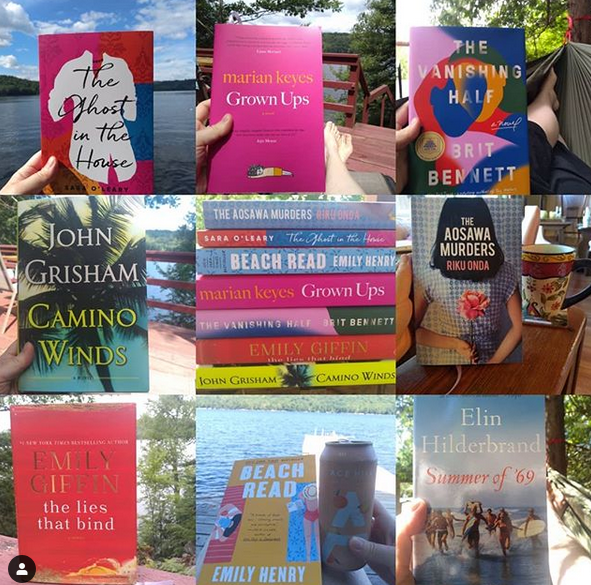
A thing I never knew until 2020 is that there is no vacation like a pandemic vacation—but what a wonderful lesson to learn. If one must live through a pandemic, I mean. Our original summer holiday was cancelled at the end of May, but summer rentals had reopened in Ontario at the same time after being closed since March, which meant there was still some availability and we wasted no time in booking. We weren’t sure what we’d find when we got to the random cottage we’d booked on the internet, or if this holiday would feel second-tier, as sad as 2020 in general. Plus what of spending time together as a family after having been holed up for months… But it was everything, beautiful with amazing swimming (I hadn’t swam for 120 days!), cut off from the world so we could forget about everything except the sky and the trees, and the way the lake was always changing. I read a book every day, relished escape from the city heat, had fun with my family, and delighted in these days of being at peace. Checking out the newspaper midweek too to learn that not much had even happened while we were gone. It was a very good week, and I’ve never been more grateful for a holiday.
July 16, 2019
Summer Reads
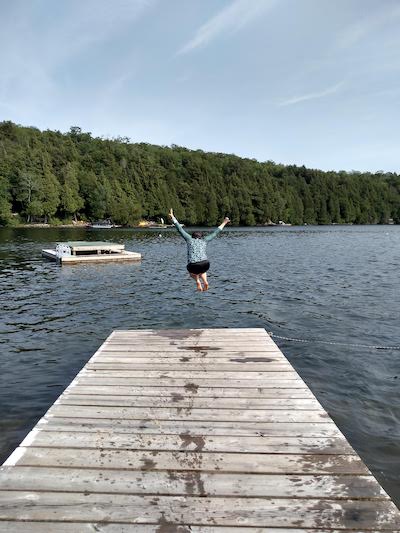
Last week was splendid, all the time in the world for swimming, reading, fun with friends, and board games, and chips and butter tarts. We couldn’t have asked for better weather or company, and it was wonderful to return to this lovely lakeside spot that we’ve been enjoying for the past four years and to be reunited with some of our favourite people. Of course, what most distinguishes a perfect holiday for me is that I got all the books read.
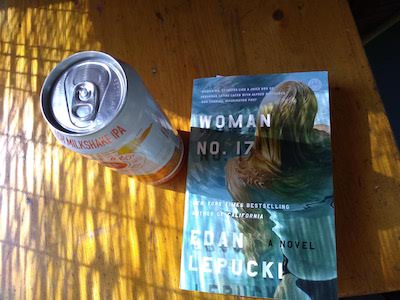
My first book was Woman No. 17, by Edan Lepucki, co-host of the Mom Rage Podcast, which I’ve become obsessed with in the last few months. And it was really good, so different, California-lit that put me in mind of Joan Didion or Rachel Kushner. Fucked-up women and what it means to be an artist, and examining motherhood from a fascinating angle—I was really interested in reading how the novel fed into Lepucki’s other projects (both the podcast and also Mothers Before). It was moody and atmospheric, and incredibly interesting. I loved it.
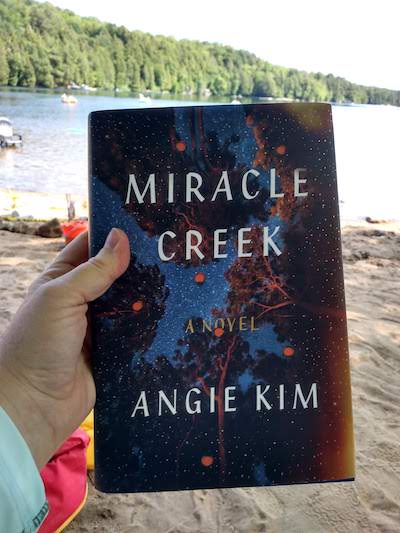
Next up was Miracle Creek, by Angie Kim, a courtroom drama by a lawyer-turned-novelist. An oxygen chamber—designed to treat such things as autism symptoms and infertility—explodes, and two people are dead, and everybody has a secret to hide. Did the mother of a young boy with autism kill her son intentionally? The machine’s owner, a recent immigrant from Korea, is not telling the whole truth either, and the novel is pretty riveting as all the pieces come together. Another book, like Lepucki’s, about motherhood and its demands on those whose children have special needs. Plot-wise, the book is excellent, although I yearned for a bit more subtlety (the last chapter is way too explainy) but I like my summer reading with a hook, so this was fine.
*
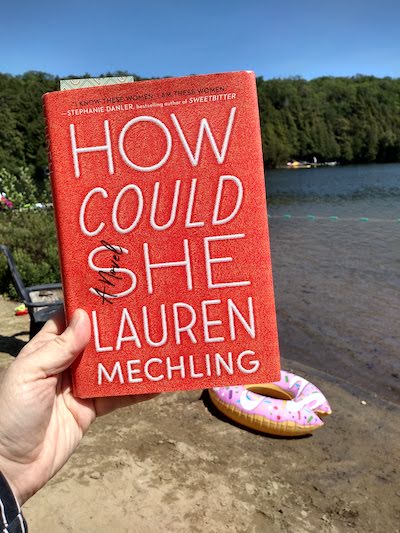
I read about How Could She, by Lauren Mechling, in Vanity Fair, which has far too little books coverage in it lately for my liking, and here was a book about female friendship that was partly set in Toronto, so I was most intrigued. It’s about a woman in her late 30s who wants to kickstart her life by moving to Manhattan, where two good friends—one an artist it-girl and the other a new mother—are well established in their lives. On the surface, the book seems light and frothy and somewhat untidy as a narrative, plus there were too many details about Toronto that were all wrong (such as, tragically, we don’t have a Shake Shack), but the whole thing came together really satisfyingly for me, and Mechling really finely articulated the weird and prickly nuance of friendship and its dynamics.
*
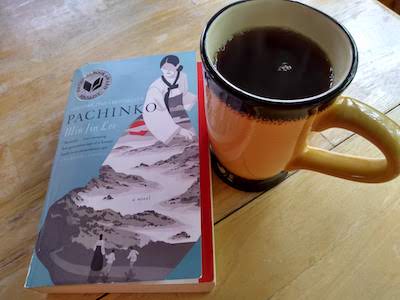
I’ve been meaning to read Pachinko for ages, and I’m perhaps the last human being on earth to get around to it. I’ve never heard anything but massive praise for this novel, a sweeping historical narrative about Koreans in Japan. And perhaps I’d been putting it off and putting it off because “sweeping historical narratives” are just not my thing, but I am glad I finally read this one, a five hundred page novel I read in a day. It was compelling in itself, but extra for me because I used to live in Japan and know that the historic prejudice against Koreans is not only historic. And it was fascinating to have a window about Japanese history that I haven’t seen before. It was an emotional and really interesting read.
*
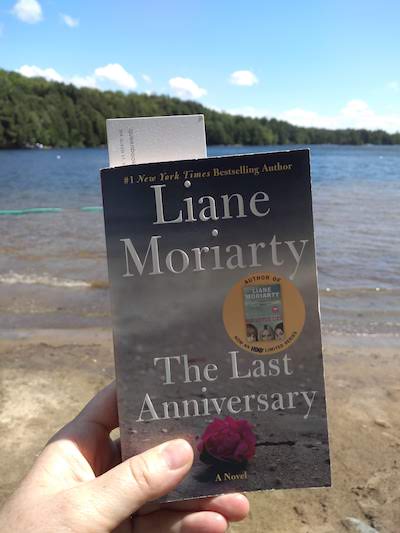
The opposite of a sweeping historical narrative is Liane Moriarty’s The Last Anniversary, which was a little bit stupid, but it was her second novel and I bought it for $8 at the drug store, so what was I expecting? It was terrific fun—family secrets, maybe murder, so much humour, and a map at the beginning!—and came together in such a smart way that foreshadows Moriarty’s eventual strength as a novelist. I also just really love mass market paperbacks and that you can buy novels at the drug store.
*
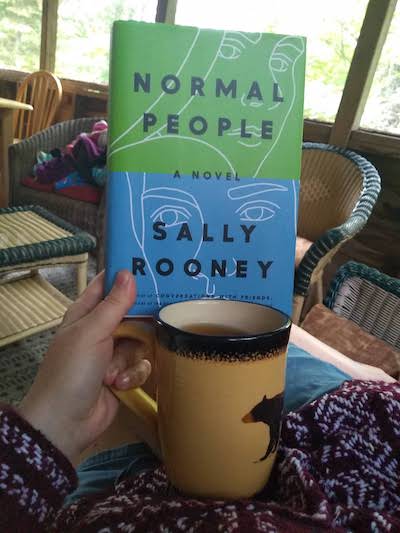
Not stupid at all was Sally Rooney’s second novel, Normal People, a novel whose hype was so amped that I almost resented buying the book, as though I didn’t have a choice in the matter. I’d read Conversations With Friends and liked it well enough, but had been led to expect way more from it than it actually delivered (and I thought it was kind of annoying). I bought Normal People after hearing Sally Rooney on the radio, and in hardcover even, but it was worth every penny. About a mismatched relationship between an outcast girl from a wealthy family and the popular boy whose mother is their cleaner, and what they find in each other and what they take from each other, and the dynamic is never static. Nothing is in this coming-of-age tale of love and friendship, a sad and beautiful heartbreaking story that was both familiar and strange at once. It was everything they said it would be.
*
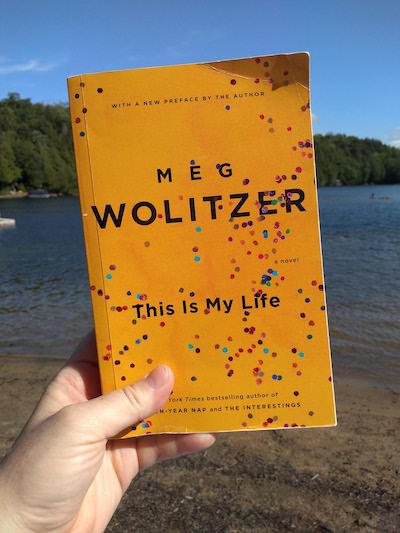
I read Normal People in a morning on our last day, when it was cool and grey and all I wanted to do was wear sweaters and read on the porch, but then the sun came out and we went back to the beach, and I got to dig in to This is My Life, from Meg Wolitzer’s back catalogue, which I bought at Books Are Magic in Brooklyn in May. And it was a really wonderful book. Flawed as a novel, as Wolitzer admits in her preface to this 2013 edition, but there were paragraphs in it that made me gasp with recognition, so perfectly articulated. It’s interesting to see what Wolitzer was up to so close to the beginning of her career, and I really loved this one. Definitely worth a read (and it was made into a movie in 1992, Nora Ephron’s directorial debut, although it looks like the movie version of the story was very different).
May 30, 2019
The Severed Wasp, and New York City
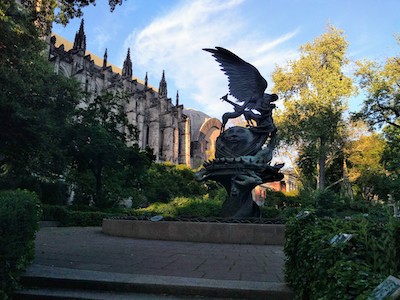
Sometimes, one’s inflexibilities rub up against each other in complicated ways, for example: yes, one wants to read Madeleine L’Engle’s lesser known novels in chronological order (ie two more Polly O’Keefe books to go before I read The Small Rain/A Severed Wasp) but also: I really want to read A Severed Wasp during the weekend we’re in New York, because of its setting (which is the same setting for The Young Unicorns, a novel I adored). So what to do? Well. because I am all cool and laidback, I just skipped ahead to be the other books, NBD. Ha ha.
So first to The Small Rain, which was Madeleine L’Engle’s first novel, published in 1945, 37 years and 29 books before its sequel, almost 20 years before L’Engle made her great success with A Wrinkle in Time. And…it was not good. There were interesting tastes of what would come to be L’Engle’s literary preoccupations—it begins with a young girl being cared for by a friend of the family, because her musician parents are unable to be there for her, which reminded me of Maggy in Meet the Austins. There is romance, there is melodrama, there are weird dynamics between teenage girls and grown men, there is a sea voyage. There are weird problems with plot and pacing, and I didn’t really like the book–it read like something terribly old fashioned written by someone who was terribly young and trying to be terribly edgy, and the effect was kind of terrible. I am glad I read it, but I desperately hoped that A Severed Wasp would be very different, but then I supposed it would be, written 37 years and 29 books later. Possibly, L’Engle has learned something about writing novels in the meantime.
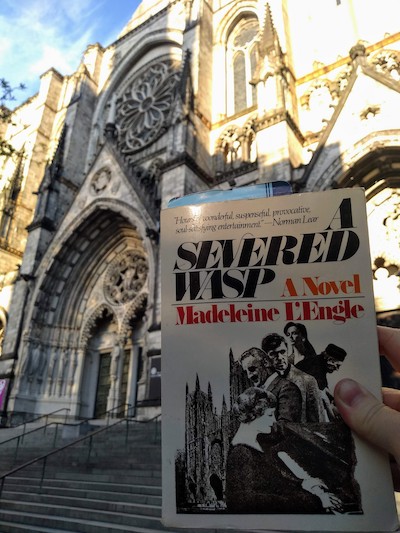
A Severed Wasp—published in 1982, and blurbed by no less than Norman Lear!—finds Katherine Forrester in her seventies now, instead of a teenage ingenue. Now widowed and retired after a hugely successful career as a pianist, she has returned to the scene of the previous novel, to New York where she came of age and suffered her first heartbreaks, and she runs into her old friend from Greenwich Village, Felix, who was once a violin-playing beatnik, but now he’s a bishop, which is the way things go in Madeleine L’Engle novels, at the Cathedral of St. John the Divine on New York’s Upper West Side.
Which is a cathedral I first encountered through L’Engle’s The Young Unicorns (1968), the one book in the Austin series that did not feature Vicky at its centre and which was odd, plot-driven, and very compelling. Dave Davidson, who was a teenage boy in the first book, appears again in this one, now grown and Dean of the cathedral, and married to ACTUAL Suzy Austin, who has realized her dream of becoming a doctor, and is also now a mother of four. Interesting because Suzy had been the one who’d always challenged her own mother’s anti-feminism, and I’d wondered about L’Engle’s emphasis on women who had abandoned dreams of career for families, as though the two were impossible to balance. But here was Suzy, doing it all, which Katherine thinks about a lot, because she is conscious of having failed her own children as she’d travelled and toured for much of her daughter’s childhood, and her daughter now remained quite distant from her—in terms of geography and emotion.
But then we will learn that Katherine’s relationship with her daughter is complicated not just for this reason, but also because the daughter was conceived not with Katherine’s husband who’d been castrated at Auschwitz, but by her Nazi prison guard, with whom she’d had a brief affair right after the war. I know, right? The Katherine of The Small Rain has not lost her taste for melodrama, but the stakes have been raised much higher, plus Katherine is receiving obscene phone calls, Felix is also receiving threats to reveal his homosexual affairs, her pregnant downstairs neighbour’s husband has having an affair with a man, the Bishop’s wife is a former pop-singer whose past involvement with drugs continues to haunt her, the streets of New York are dangerous and riddled with crime, and Suzy Austin’s youngest daughter had lost her leg not long ago after being hit by a car in what may or may not have been an accident.
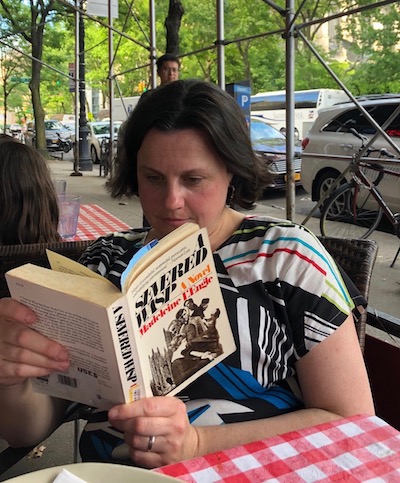
Too much, all of it. Also, too many racist stereotypes—the worst. But the plot did unfold in a most compelling way, and actually being in New York as I was reading made the whole thing much more meaningful to me. (I don’t think many people make A Severed Wasp pilgrimages. There wasn’t even a copy of the book in the Toronto Library system. I had to order a secondhand copy. My instagram hashtag was the only one!) We went to the Cathedral on Friday evening (“The very size of the Cathedral was a surprise…” the book begins. It was!) and got there too late to be able to visit or even explore the grounds, but I just wanted to see it anyway. (Would have been interested to see the plaque that is apparently there once the Cathedral was made a literary landmark because of L’Engle in 2012—she was a writer in residence and librarian there for decades.) We did get to the see the albino peacock in the garden, although the peacocks in the novel seemed to have been conventionally coloured.
We had dinner across the road from the cathedral, and then it was very exciting to be reading the next day and realize that the very place we’d eaten at—the V&T—was described by Suzy Austin was “the best pizza in New York.” It really was! And then the next day we visited other parts of the city, and though I never got to Tenth Street, where Katherine lives in Greenwich Village, we were just close enough that I felt her presence and the streets she’s describing. And the book was in my bag the entire weekend, to be taken out and read on long subway journeys—not that Katherine ever took the subway. I don’t think she even knows it exists.
“Odd, how complex and intertwined life is. Every time I think I’m settling for chance and randomness, then pattern enmeshes me in its strands.”





